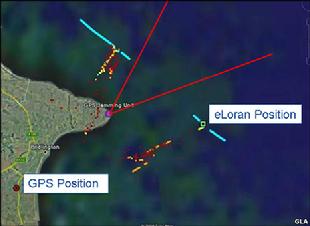|
Vincent Pica
Chief of Staff, First District, Southern Region (D1SR)
United States Coast Guard Auxiliary
|
US Air Force continues plans to modernize GPS – but..?
|
Without a doubt, GPS is used in everything from farming and aviation to public safety and disaster relief and recreation, not to mention its military purpose of providing precision navigation and timing to our combat forces. And we’ve covered it here many times. In fact, this is the 8th column* on some facet of GPS – or GPS vulnerability. This column is about both.
Hooked…
First and foremost, GPS is a military imperative. We as tax payers benefit from its enhancements but it has to work for our armed forces – land, sea and air. And as military requirements go up, so does therefore the capabilities of GPS. In fact, the current GPS system is unable to deliver what our armed forces need – so GPS-III is being put aloft. This naturally requires an entire new ground control system. The Air Force took the next step in that process when it awarded a contract last month to Raytheon Company for the Next Generation GPS Control Segment, now referred to as OCX. Associated with awarding this $1.5bb contract to Raytheon, in a press release issued by Schriever Air Force Base in Colorado, Lt. Col. Deanna Burt, 2nd Space Operations Squadron commander, made the following comment. "OCX is the new ground system that will replace our current Architecture Evolution Plan ground system. OCX is critical for us as we cannot fly GPS III satellites with our current ground system." The contract will include development and installation of hardware and software at GPS control stations at Schriever AFB and at Vandenberg AFB, Calif., deployment of advanced monitor stations at remote sites and initial contractor support with sustainment options for five years. The new ground system will also allow for command and control of an additional number of satellites. "OCX is also meant to fly up to 64 satellites where our current system can only fly up to 32 satellites," said the commander. This modernization doesn't leave the “old” GPS satellites flying “blind.” OCX will maintain compatibility with the current satellite constellation and enable new modernized signal capabilities. Win, win, win.
Spammers, Spoofers and Hackers
On 2/23/10, the BBC reported on a meeting at the National Physical Laboratory in Teddington, UK, focusing on the increasing vulnerability of GPS systems world-wide. (http://news.bbc.co.uk/2/hi/science/nature/8533157.stm) "GPS gives us transportation, distribution industry, 'just-in-time' manufacturing, emergency services operations - even mining, road building and farming, all these and a zillion more," David Last, a consultant engineer and former president of the Royal Institute of Navigation, told the conference. “But what few people outside this community recognize is the high-precision timing that GPS provides to keep our telephone networks, the internet, banking transactions and even our power grid online."
"The Achilles heel of GPS is the extremely weak signals that reach the receiver."
Each satellite in a sat-nav constellation is putting out less power than a car headlight, illuminating more than a third of the Earth's surface at a distance of more than 20,000 km.” This is what makes it possible, if not easy, to jam GPS signals. In fact, our military does it to suppress enemy abilities in this area, as they try to do to us.
|
Of a more serious nature, GPS receivers can be "spoofed" - not simply blinded by a strong, noisy signal, but fooled into thinking their location or the time is different because of fraudulent broadcast GPS signals. Someone with mal-intent can now buy a simulator, link it to Google Earth, put on a route and it will simulate that route to the GPS. "A GPS receiver overcome by it will behave as if you're travelling along that route”, said Professor Last. Admittedly, this isn’t easy but terrorists are determined agents.
|
 |
| In the UK trial, GPS in the jamming zone (red triangle) reported positions tens of km away from the true (eLoran) position – courtesy, BBC |
|
|
The immediate solution to the problem is not clear, since the existing US GPS and Russian Glonas systems, and the forthcoming European sat-nav effort Galileo, are equally susceptible. So, I sent an email to the GPS Controllers at Schriever AFB.
Dear Sirs:
Recent BBC articles continue to note that GPS is, essentially by design, highly vulnerable. http://news.bbc.co.uk/2/hi/science/nature/8533157.stm
I read with interest the OCX announcement but it speaks more to control than vulnerability fixes... Is there anything that can be said about these concerns?
V/R,
Vin
------------------------
Vincent T. Pica, II
District Captain, SECLIS-S, D1SR, USCGAux
USCG licensed Master
Serve - Contribute - Grow
|
Contact Us Submission
|
|
|
|
|
|
E-mail successfully sent to: GPS Operations Center
|
|
|
|
Look for their reply in future columns…
|
BTW, if you are interested in being part of USCG Forces, email me at JoinUSCGAux@aol.com or go direct to the D1SR Human Resources department, who are in charge of new members matters, at DSO-HR and we will help you “get in this thing…”
|
| <-- click there to tweet, post or otherwise distribute to the 'net
|
|